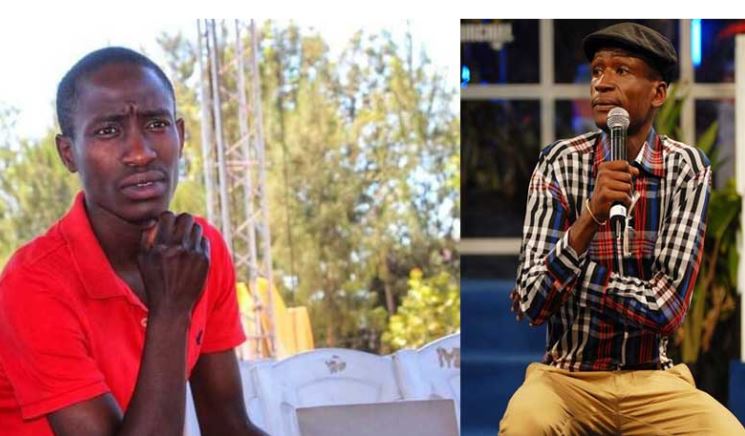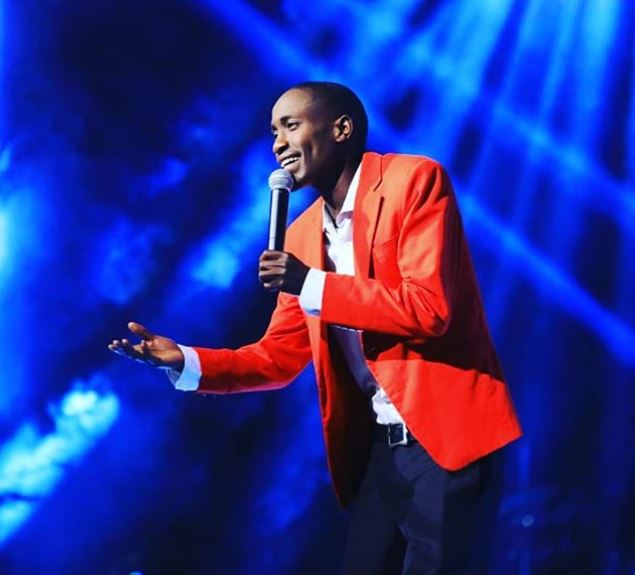
He speaks about what he had to do to rise to the top, his close relationship with the late Ayeiya, and more.
Also Check Out: At Sh1000 Per Episode, Comedian Blames Churchill for Ayeiya Dying a Poor Man
You and the late comedian Ayeiya were close, how did you meet?
We met in 2006 at Carnivore when I was looking for a job as a comedian. Maina Kageni had referred me to producer Bob Nyanja who at the time worked with Churchill Live. It was while waiting to see Bob that Ayeiya walked in and asked to borrow my pen. We had a conversation and became great friends.
Let us in on what transpired on the night of his sudden demise …
Prior to the fateful night that Ayeiya died, we spent time together at his place before leaving to have lunch at a place in Langata before our shows at Carnivore.
His show was slotted a few hours ahead of mine so we spent the whole evening together. After his show, I asked him if he had a ride and he assured me that he would be alright as a fellow comedian WaKimani would drop him home. To date, I regret not insisting that he stays behind until I was done.
How did his death affect you?
Death robbed me of my mentor, friend and brother. We spent lots of time bonding and exchanging ideas. He often invited me along on outings with his family. Whenever I mention his name, I find it hard to believe he is no more. Every time I perform, I do my best in his memory.
You grew up in the ghettos of Nakuru Town…what was that like.
I was born and raised in an area known as London where our house rent was a meager Sh300 but my family was often locked out due to lack of rent. On top of this, my primary school fee was also Sh300, but would often be sent home because we could not pay. My mother Jacinta Wahu sold tomatoes while my dad, a casual labourer at a construction site, struggled hard to take care of the five of us.
What inspires your jokes?
I write about my life experiences, things that interest me in relation to Kiambu, where I live. If an unusual set of circumstances arises or I learn something that I can’t stop thinking about, chances are I will try to write a joke about it. My father’s funny side of life is my second inspiration. He is one person who has always been real and funny at the same time. I write my own routines.
What happens if the audience doesn’t laugh?
Bombing is inevitable. Everyone has sets that don’t go well. But as for me, I don’t get so panicky. I will adjust the type of material I am doing or try to engage the crowd directly. If none of that works, I just detach and watch myself bomb from outside my body. Then I leave and eat mutura and try to do better next time. There are times when I laugh at my own jokes … with the hope that with time the audience will join in the laughter …. and that makes it funny.
Has this ever happened to you?
Yes. My first time on Churchill Raw was a flop even considering I was set to go after a session of encouragement by Victor Ber. To my surprise, the moment I got on stage all my jokes evaporated. I spent the next five minutes laughing amid stares by the audience. My second audition with Allan Weku was no different. Only this time round, I managed to crack a single joke after endless sessions of trying to interact with the audience before the rest of the jokes disappeared into thin air. My last words were; Thank you Nairobi, I love you.
What followed next?
I got the lecture of my life from Weku who in turn decided to give me a two months break from comedy… insinuating I was better off as a journalist. At the time, I pursued a course in Journalism at Magenta Training Institute, Nairobi.
Go on….
After persuasion through numerous phone calls, I secured a second chance to stage various audition shows. I would write some of the jokes on my hand – lest I forget. But I would get on stage and struggle for minutes trying hard to crack a joke in vain amidst stares from the seemingly serious audience who would signal me to leave the stage.
How do you deal with hecklers?
I love them considering that real, mean-spirited hecklers are not as common as people think. Most people come to a comedy show to enjoy it rather than destroy it from the inside. More often than not, if someone is yelling things during a show, that person is drunk and doesn’t realise how loud they are…or they could be vocally enjoying the show and doesn’t understand that it’s disruptive. In such cases, I usually try to politely ask the offender to be a little quieter for the sake of the show. There are times when I try to be funnier or louder than the heckler and then feel frustrated for the rest of the night that I had to deal with a jerk.
You make a living from this?
Yes, I do…this is the best job in the world.
Why comedy?
I am a great fan of my dad Charles Maina who was and still is a living comedy proof in the house judging by all his mannerisms. My interest for comedy stems way back to my school days. Fellow pupils always told me I was a born comedian. As a result, a girl named Mercy paid for my first fare for the auditions.
Were you always funny?
No, not by a long shot. I was always the guy who was trying to come up with something funny to say ages after the moment had passed and rather than letting it go, would say it completely out of context. It still happens.
Your advice to aspiring Kenyan comedians?
To put God first, in whatever they do. Use prayer as a weapon besides having self-belief, hard work, patience and determination to succeed.
Source: SDE







